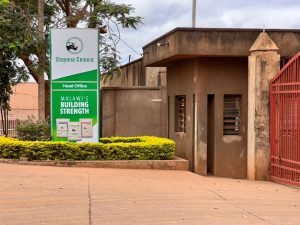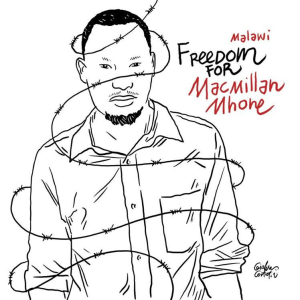BT CITY COUNCIL ACCUSED OF SELLING WETLAND TO CONTROVERSIAL ASIAN BUSINESSMAN

Chaudhry with President Chakwera during a September 2021 meeting at State House. (Photo off Yamikani Nicholas Kachingwe FB wall)
BY PIJ REPORTER
Blantyre City Council (BCC) and the Ministry of Lands are facing allegations of disregarding regulations and environmental laws by selling a piece of land in Blantyre that was designated as a wetland. The sale has raised concerns about the potential harm to the Mudi River, which is vital to the city’s environmental conservation efforts.
The disputed land, situated at Mount Pleasant along Victoria Avenue near Malawi Blood Transfusion, PSI, and Barbecue Gardens, recently became the site of construction activity despite its designation as a wetland area. Land and environmental conservation experts have pointed out that construction should not occur on this land due to its wetland status.
According to the United States Environmental Protection Agency (EPA), wetlands are unique ecosystems characterised by being flooded or saturated with water, either permanently or seasonally. Contrary to misconceptions, wetlands offer numerous benefits, including natural water quality improvement, flood protection, erosion control, recreational opportunities, aesthetic value, and access to natural resources at no cost. Protecting wetlands is crucial for the safety and well-being of communities.
The EPA further explains that wetlands act as natural sponges, absorbing and slowly releasing water from various sources such as surface water, rain, snowmelt, groundwater, and floodwaters. Wetland vegetation, including trees and root mats, also mitigates flood damage by slowing the water flow and distributing it more gradually over floodplains. This water storage and braking action reduces flood heights and minimises erosion.
Wetlands located within or downstream of urban areas are precious as they counteract the increased rate and volume of surface water run-off caused by paved surfaces and buildings. The capacity of wetlands to hold water helps control floods and prevents waterlogging of agricultural fields. Preserving and restoring wetlands and other water retention measures can often provide adequate flood control without resorting to expensive dredging operations and levee construction.
Despite the significance of wetland preservation, the Ministry of Lands and the BCC allocated the disputed land to Blantyre businessman Karamat Chaudhry, who has a history of involvement in controversial land transactions. It has been revealed that Chaudhry intends to construct a three-story shopping mall on the wetland site.
Although the Ministry of Lands promised to get back to us with a response, they had not done so as we went to press.
Chaudhry could not be reached on both his mobile phones as they were off.
However, the Blantyre City Council said the land in question was originally an open space under the ownership of the Ministry of Lands and not a wetland as claimed.
“In the first place, the space isn’t wetland as is implied. It was an open space that ticked all the checkboxes upon looking at all factors for creating a workable plot. The visitation to the site by the Town Planning Committee (TPC) was to ascertain the extent of a small creek that runs behind the plot and see if it would have any impacts on the proposed developments, but this was also okayed as being too small to cause any adverse effects to the projects and or the neighbouring properties,” BBC’s spokesperson Debby Luka said.
She told PIJ that BCC followed due diligence in handling the said plot.
“BCC’s first involvement in this matter was in 2018 when the Department of Lands, through the Regional Commissioner, applied for the creation of a residential plot from the existing open space (often called an infill plot). Due diligence processes were followed by the TPC, such as visiting the site to ascertain its worthiness. It was later discovered the existence of two separate deed plans that were issued by the Surveyor General on the said parcel of land, which was later clarified, and the recommended deed was adopted and is the one in use to date,” she said.
According to Luka, in 2019, Chaudhry submitted a change of use of the plot, BC1288, from residential to commercial to put up a commercial enterprise together with a service station.
“The Committee deferred the application and advised the applicant to resubmit the proposal minus the service station owing to the closeness of other existing service stations in the neighbourhood. Revised outline commercial development plans were resubmitted. On 16 September 2022, the TPC approved the change of use and the proposal subject to the final scheme being designed by architectural and structural engineering consultants, including provisions for adequate parking spaces,” she said.
Luka added that in January 2023, detailed commercial developments on the site, minus the service station, were submitted to the Council. The TPC, at its meeting on 29 March 2023, agreed to revisit the site to verify the setbacks that were provided off Victoria Avenue and all other roads, including the space designated for parking space. At its site visit on 12 June 2023, the TPC okayed the commercial development proposal. The applicant was then written to commence construction of the project.
However, Mount Pleasant residents who had previously attempted to acquire the land from the Council claim they had continuously been told that the area is reserved as it is a wetland.
Tabi Kowet, whose family owns Plot BC 700 adjacent to the wetland, told PIJ that his family had been to the Council offices over the past three decades to inquire about the land. Still, they had continuously been told that it was reserved.
“The Council always told us the land was reserved because it is a wetland. That is why we are all surprised by this development. It raises a lot of questions,” he said.
In a June 20 complaint about the proposed three-story shopping complex to the BCC, Kuwait raised several concerns about the project.
“The proposed development is taking place in a wetland area. An environmental impact assessment would have identified issues of destroying the ecosystem that is present due to the stream that runs through the proposed development. In addition to destroying the ecosystem, this development will increase the risk of flooding upstream due to water flow restrictions. In light of the damages and loss of life that the recent cyclone has caused, we request that the relevant authorities revisit the environmental impact assessment reports of the proposed development and advise what measures to have been taken in this regard,” he says in the letter, which is yet to be responded to.
Kowet further notes that commercial property development should have required rezoning as it is situated in a primarily residential area.
“According to the city’s by-laws, this rezoning would have required all interested stakeholders to be consulted. To date, we have not been consulted, nor have any of our neighbours. We believe this process to be substantially flawed and a flagrant disregard of the City’s by-laws,” he says in the letter.
Part of the wetland in Blantyre’s Mount Pleasant suburb, where an informal car wash operates
Wetlands Are the Lungs of the City
In an interview with PIJ, Robert Kawiya, an environmentalist and former director of Leisure, Culture, and Environmental Services at the Blantyre City Council, expressed concern that developing the wetland would have detrimental effects on the Mudi River, which he referred to as the “lungs” of the city.
Kawiya emphasised that the city council has the authority and responsibility to prevent such developments, stating that the planning director should have halted the construction and the environmental director should have objected to encroachment on the green space. He further explained that any development on the land would be illegal if the town planning committee at the BCC did not approve the creation of plots.
Kawiya also disclosed two designated wetland sites in Blantyre, with the other site situated nearby.
An urban planning and land management expert, Jolly Kenan, explained that construction should not be done in reserved areas such as wetlands, roads, and river reserves. Exceptions to this rule may be granted in exceptional circumstances, subject to fulfilling conditions set by the planning committee of the relevant authority. These conditions often include conducting a detailed Environmental Audit or Environmental and Social Impact Assessment, depending on the project’s size, and demonstrating that the project serves the public interest.
Jimmy Gondwe, the honorary secretary of the Malawi Institute of Physical Planners, warned against encroachment on fragile areas such as wetlands, steep slopes, and riverbanks in Blantyre City. Gondwe emphasised that all physical development in the country must obtain development permission from the relevant planning authority, as stipulated by the Physical Planning Act, 2016 (Amended 2022). He further highlighted that development on ecologically sensitive land should also require clearance from the Environmental Protection Authority, according to the Environment Management Act.
Tawonga Mbale-Luka, the acting Director General of the Malawi Environmental Protection Authority (MEPA), pledged swift action to investigate the alleged anomalies surrounding the land sale. Mbale-Luka pointed out that two potential offences may have been committed, developing without certification and developing in an ecologically sensitive area. MEPA inspectors were scheduled to visit Blantyre to conduct inspections and gather concrete information regarding the case.
Chaudhry has several pending cases with the Police and the ACB
Habitual Law Offender
This is not the first time Karamat Chaudhry, president of the Pakistan Overseas Community (POC), has been implicated in land-related controversies. In the past, he faced investigations for allegedly forging corrupt relationships with influential Blantyre City Council officials, enabling him to acquire commercial land through improper means. Chaudhry has been involved in various business ventures, including constructing service stations and supermarkets on land he allegedly obtained through dubious means.
Chaudhry and his brother Azhar Chaudhry were previously investigated for tax evasion, money laundering, corruption, and foreign exchange externalisation. Court documents indicated that the brothers had illegally externalised significant foreign currency on multiple occasions. Furthermore, apart from owning a supermarket chain, the Chaudhry family had contracts with the Malawi Police Service to supply uniforms.
In December 2021, Karamat Chaudhry, Naeem Lakhu, and Shiraz Fereira were arrested for money laundering and foreign exchange externalisation. The trio allegedly opened a fake account with a local commercial bank, using it to transfer approximately K1.28 billion to countries such as the United Kingdom and China, where they operated businesses under the name SF International.
Authorities are investigating these allegations, including the potential connections between the Chaudhry family and political figures. The Anti-Corruption Bureau (ACB) has previously pursued cases related to forex externalisation involving Karamat Chaudhry.
The sale of the wetland and the involvement of a controversial businessman have raised serious concerns about the disregard for environmental regulations and the potential consequences for the Mudi River’s ecosystem.





